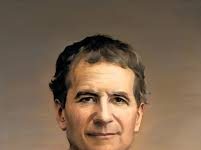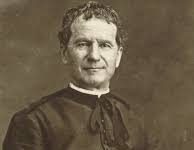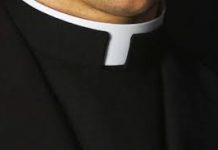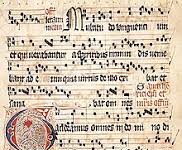Already suffering the sustained heat of this long, hot summer, Catholics everywhere have also been stunned by the sudden fall from grace of Cardinal Theodore McCarrick and the strange sense of foreboding that goes with it.
Is this a turning point in Church history, they’re wondering? Has Holy Mother Church reached a nadir? And if so, how should Catholics respond to the disturbing revelations that, as the widely respected Archbishop Emeritus of Washington DC and confidante of popes and media, McCarrick may have molested two minors decades ago and many seminarians and priests? And yet as spokesman for the US Conference of Catholic Bishops on the sex abuse crisis in 2002 he called for a zero-tolerance policy?
Will they ever feel able to trust clerics – any clerics – again?
First resignation since 1927
Pope Francis accepted McCarrick’s resignation from the cardinalate — the only cleric to do so since 1927 and the highest ranking U.S. Catholic clergy member ever to be removed from ministry due to sexual abuse allegations. The Pontiff also ordered McCarrick’s suspension from the exercise of any public ministry and obliged him to remain in an undisclosed house for a life of prayer and penance until the accusations made against him are examined in a regular canonical trial.
In June, McCarrick, 88, was found to be credibly accused of abusing a teenager nearly 50 years ago, and guilty of additional allegations of sexual abuse and harassment over several decades. Victims include three adults who were young priests or seminarians when McCarrick reportedly abused them. A Virginia man, now in his 60s, has also filed a police report alleging that McCarrick began sexually abusing him from the time he was 11 years old. The man said the serial abuse began when McCarrick was a priest of the Archdiocese of New York and continued for almost two decades, the New York Times reported.
The last cardinal to be stripped of his rights and duties as a cardinal was Cardinal Keith Patrick O’Brien, the late emeritus archbishop of St. Andrews and Edinburgh, following allegations of sexual misconduct that came to light between 2013 and 2015. However, unlike McCarrick, O’Brien was permitted to retain the title of cardinal and faced no canonical trial. Cardinal O’Brien died earlier this year.
Yet questions remain as to why the Vatican is only now taking action against McCarrick, when bishops have been saying they knew he was abusing seminarians but remained silent.
Similar questions also remain around a host of other current — and equally disturbing — sex scandals which, taken together, are now forming an ever-darkening penumbra of scandal around the Vatican and the Holy See.
The Licentious Litany Grows
On July 30, Pope Francis accepted the resignation of Australian Archbishop Philip Wilson of the Archdiocese of Adelaide following calls, including from Prime Minister Malcolm Turnbull, for the prelate’s removal. In May, Wilson was convicted of failing to report allegations of child sexual abuse disclosed to him in the 1970s. Wilson, 67, was convicted May 22 of concealing abuse committed by a fellow parish priest in New South Wales in the 1970s. He was sentenced July 3 to a 12-month sentence, which will likely be served as house arrest, but said July 4 he planned to appeal the conviction.
Meanwhile the Honduran Bishops’ Conference have been answering to accusations of a homosexual network at a major seminary, reported recently in the National Catholic Register which said that nearly fifty seminarians had written a letter to bishops complaining of a homosexual network in Tegucigalpa’s major seminary, which they said is protected by its rector, and for which they have evidence.
“Heterosexual seminarians are scandalized and really depressed,” one of the seminarians who drafted the letter told the Register. “Many are thinking about leaving the seminary,” the seminarian said, speaking on condition of anonymity because of a fear of reprisals. “I fear that many will leave.”
In a statement issued July 29, the bishop’s conference of Honduras denied any institutionalized promotion of practices that are contrary to the morality and norms of the Church. The Archdiocese of Tegucigalpa is headed by Cardinal Oscar Rodriguez Maradiaga, coordinator of the C9 Group of cardinals advising Pope Francis on Church and Curia reform.
While Cardinal Maradiaga is not himself the subject of allegations of sexual misconduct, he is now under fire for appearing to have disregarded a wealth of evidence of homosexual misconduct by Bishop Pineda, whose resignation as auxiliary bishop was accepted by Pope Francis July 20.
The bishops’ conference, however, has released an official denial: “With all certainty and truth, we affirm that there does not exist, has not existed, nor should exist in the seminary an atmosphere such as the one presented in the news report at NCR (the Register) which gives the impression that institutionally there is the promotion and sustaining of practices opposed to the norms and morals of the Church under the complacent watch of the bishops.”
The statement, however, did not refer to or deny the contents of the seminarians’ letter, nor any of the other substantiated facts in the article.
The Stain Spreads
In Chile, meanwhile, a cardinal has been ordered to give an account of himself and his handling of clerical sexual abuse to a secular authority.
Cardinal Ricardo Ezzati, Archbishop of Santiago and former head of the Episcopal Conference of Chile, is scheduled to meet August 21 with prosecutor Emiliano Arias in Rancagua to discuss what responsibility Ezzati may have had in covering up the crimes of disgraced Fr. Oscar Muñoz. Of Muñoz’s seven alleged victims, five of them are his own nephews. Rancagua is also the site of an ongoing investigation into a group of more than a dozen priests who called themselves “The Family” and have been linked to sexual abuse, homosexuality, and prostitution.
Ezzati, 76, was indicted after Arias found a letter written in 2013 by another Chilean archbishop of Rancagua accusing the Cardinal of mishandling the clerical sexual abuse scandals.
Meanwhile, back in the U.S., the bad news continued August 1 when the Diocese of Harrisburg released the names of 71 priests, deacons and seminarians accused of sexual misconduct involving children in the diocese during the past 70 years. At the same time, Bishop Ronald Gainer of Harrisburg issued an apology to abuse survivors. The list includes 37 priests from the diocese, three deacons from the diocese, six diocesan seminarians, nine priests from other dioceses, and 16 members of various religious communities. Many of the allegations have already been made public.
The Church Entering the World?
Sadly, this most recent spate of scandals indicates that the problem remains deeply entrenched, suggesting that Holy Mother Church may now be entering a period of public exposure — as in the scriptural promise ‘Be sure, your sins will find you out’ Numbers 32:23 — leading to a much needed period of purification.
But a question: Could the besetting sin inherent in all this be the very one Venerable Archbishop Fulton Sheen warned about during Vatican II? Could this be the disaster he said was certain to occur if the Church decided to join the World?
“In the Second Vatican Council, it was not schism or heresy that was at issue, but rather the Church and the World,” he wrote in his autobiography. “The world pouring into the Church and the Church rushing into the world. Man was becoming the centre and reference point of everything this Church could not accept, for it was the church’s mission to affirm a divine intervention in the world. The Church could not pull up all the drawbridges, lock all the doors, close all the highways which united herself to the world. The answer was not to be found either in an isolation from the world by erecting a red stoplight outside St.Peter’s Square; neither could the Church answer the same challenge the world hurled at its Head on the Cross: “Come down (from the Cross) and we will believe.”
This was the world — full of itself and sick with “progress” — that the Vatican Council had to deal with, Sheen writes.
It was this world the Church had to deal with since the early 1960s when its cultural forces began working furiously to legitimize and condition the world to accept all sorts of practices that hitherto had been regarded as criminal (including abortion and homosexuality). And it is with this world — which cleverly began to demand ‘tolerance’ — that the Church now finds herself impossibly compromised.
The result was a dilemma, the horns of which now threaten to rip her asunder: Is homosexual practice a grave sin or is it merely a naturally tendency which may, even must, be indulged and its consequences regarded as “harmless”?
Today, the world insists on the latter.
Diabolical Disorientation
But what organization – whether Divine or strictly Temporal — can have it both ways? How can Holy Mother Church, which for two thousand years has been regarded as the moral teaching authority of the world, simultaneously denounce homosexual practice while silently tolerating it among its ranks?
Talk about ‘diabolical disorientation’, the term coined by Sister Lucy of Fatima to describe a situation in which a person — and even the Church — finds herself disoriented, in a state of confusion and losing her bearings.
“If men cease to sit in judgment on evil deeds, it is not because they are tolerant, but because they are defeated,” writes Randy Engel in Rite of Sodomy (2011), his multi-volume history. “Tolerance is a social, not a religious virtue since the truly religious man is against the heretic and seeks the conversion of the unbeliever.
True Christianity has never held tolerance to be a virtue but a sign of degeneracy.”
The 11th century saint, Peter Damian was even more explicit: He believed sodomy surpassed the enormity of all other vices, that it invariably brings death to the body and destruction to the soul which is separated from God.
Until relatively recently, however, homosexuality was regarded as a vice and denounced in every civilized nation and in the Church from its earliest beginnings which condemned it as an unnatural, gravely sinful and morally degrading practice.
Yet all this began to change, beginning about forty years ago when the Gay Liberation movement first broke onto the American scene, representing a world view and moral system as alien and hostile to Christianity as it is to the legitimate interest of the State. Yet neither of these two traditional defenders of the common good and the moral law has moved definitively against the growing threat posed to both by what Engel labels as the “Homosexual Homintern”.
“What is at stake is not merely a matter of controlling or minimizing some societal or clerical mischief, but the prevention of the undermining of the very foundations on which Church and State rest,” Engel continues. “This is why at all times and in all civilized cultures, homosexual practices, wherever they have been manifestly public, have brought censure by the St.ate which has both the duty and the right to suppress vice for the common good, and the Church which is the final arbitratrer of morals in society and the primary molder of the public conscience.”
Church complicity?
But, as Archbishop Sheen suggests, this focus may have been lost or derailed along the way: “The Church has joined the world and behind closed doors adopted many of its errors, particularly on homosexuality which the Church has long rightly condemned as intrinsically disordered but which the world insists is a naturally occurring state which must be accorded a host of rights, regardless of its destructive and anti-life tendencies.”
So, in face of this latest barrage of scandal that many are now calling “the last straw”, how should the deeply unsettled Catholic respond?
The answer is both simple and fundamental.
We remain in the Church because it is true.
And because, as renowned Catholic writer and publisher, Frank Sheed, once put it: “We are not baptized into the hierarchy; do not receive the cardinals sacramentally; will not spend an eternity in the beatific vision of the pope. Christ is the point.”
What’s also needed in this era of Church corruption and confusion is what’s always needed: prayer, fasting and conversion.
A final thought. Yes, we stay Catholic because the Faith is true and absolute. But we also stay because the Truth of what Holy Mother Church has always taught has been confirmed in the breach of it throughout history — that is, in the failure to observe it in its fulness. As it is today.
Has breaking the natural laws of chastity — along with the tolerance, even encouragement, of homosexual practice and pride — resulted in happier people and a kinder, gentler world?
You decide.












